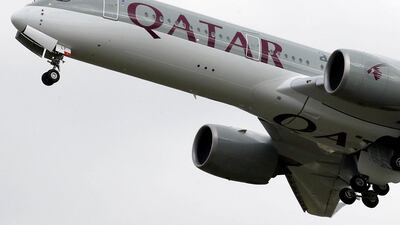Qatar's gross domestic product will slow to 1.9 per cent this year from 2.2 per cent last year as the country's hydrocarbon industry continues to suffer from, a global oil deal and the ongoing boycott by a quartet of countries led by Saudi Arabia dents consumer and investor confidence, according to BMI Research.
"Following a weak first half of 2017, we expect growth in Qatar's hydrocarbon sector to remain sluggish over the quarters ahead, amid tight compliance with Opec stipulated oil supply cuts and limited gas output gains," the report said.
"The ongoing GCC diplomatic crisis will continue to weigh on consumer and investor sentiment to some extent, while also directly hampering tourism and transport activity."
The research firm said that Qatar's economy would grow 2.5 per cent in 2018.
Opec member Qatar is adhereing to a global oil output deal that is trimming 1.8 million barrels of oil a day from the marke to help prop up prices. The deal, between Opec a group of oil producers led by Russia, has been extended into the March of next year.
BMI noted that tourism, 40 per cent of which comes from the Arabian Gulf, and aviation will see a substantial slowdown in activity. The Qatar Tourism Authority said that GCC visitor arrivals to the country dropped 7 per cent year-on-year.
_________
Read More:
Qatar draws on sovereign wealth fund to support struggling economy
_________
Separately, Qatar's central bank said that its international reserves and foreign currency liquidity dropped to 129.6 billion riyals in September from 141.8bn riyals in August, according to Bloomberg News. At the same time, the balance with foreign banks fell to 36.1bn riyals from 45.2b riyals during the same period. Meanwhile, foreign securities declined to 18.2bn riyals from 21bn riyals.
Qatar has been forced to repatriate significant sums from its sovereign wealth fund to shore up its struggling economy, which continues to experience the impact of an economic and political boycott by its Arabian Gulf neighbours and other countries.
Ali Shareef Al Emadi, the country's finance minister, told The Financial Times last month that the Qatar Investment Authority, whose assets under management are estimated to stand at about US$300bn, had brought back more than $20bn into the country since the stand-off with its neighbours began in June, but denied it had to make asset sales to raise the money.
The UAE, Saudi Arabia, Bahrain and Egypt on June 5 broke diplomatic ties with Qatar and cut off air, sea and land access to the country over Doha’s support for “terrorist groups aiming to destabilise the region”. The dispute is the most serious between GCC members since the organisation’s creation in 1981.

